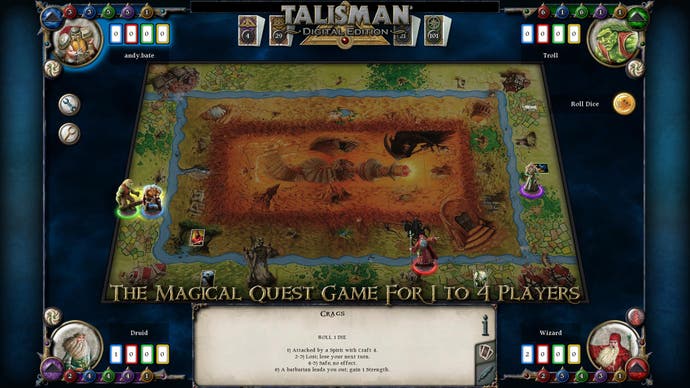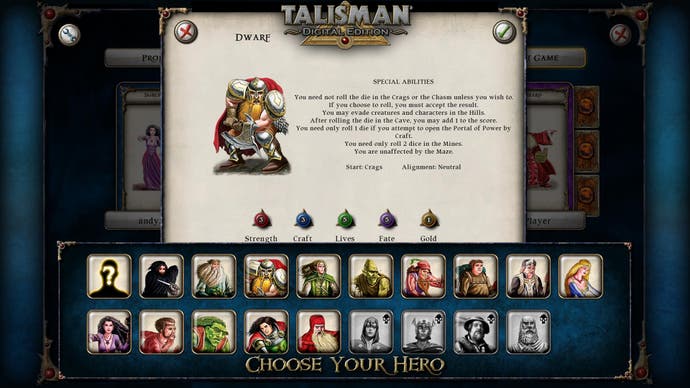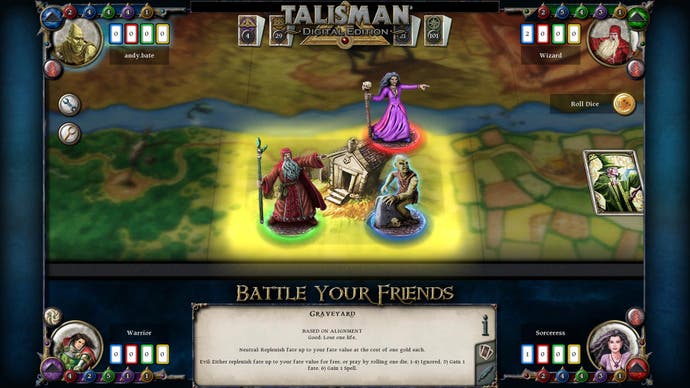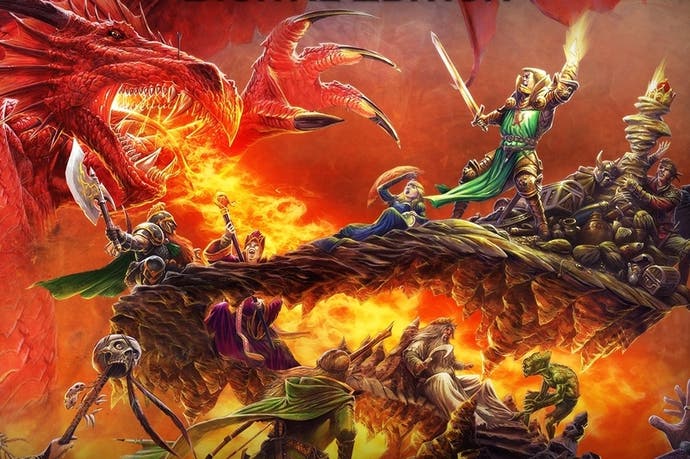Talisman: Digital Edition review
Stop the game, I want to get off.
Let's get something straight, before we begin. Talisman isn't just a video game. You're witnessing the digital rebirth of an institution. Talisman: The Magical Quest Game was first published as a board game in 1983, when the venerable ZX Spectrum was a feisty little juvenile.
This was a "roll and move" game, where players were catapulted around the board at the whims of a die, but it was also a grand adventure. You killed monsters, found treasure, mugged other players, and ultimately ventured into the more dangerous inner regions of the board. In the dead centre the "Crown of Command" was to be found, which basically (there's no noble way of saying it) let you spam attack spells at the other heroes until all your friends were dead.
What followed was a demonstration of commercial resilience that makes Final Fantasy 7 look like Blinx: The Time Cat. Over the next 30 years Talisman would receive three new editions and dozens of expansion boxes - and it's still being developed. The new ninth expansion for Talisman's Revised 4th Edition, The Firelands, came out just last month.
This is an old game. A noble game, unchanging across decades. It demands respect.
So I'm going to take great pleasure in giving it absolutely none, because even this Digital Edition for Steam and, soon, iOS and Android is definitely still a board game from the 80s that plays like having your fingers broken by a copy of the Monster Manual.

Whether you're playing online or against the AI, literally all you do in the opening third of a game of Talisman is roll a die and decide whether your hero goes that many spaces clockwise or anticlockwise around the board. Most of the time that'll take you to a wilderness-type space where you can draw an Adventure Card, which is a lot like opening a D&D module to a random boxout. An alchemist might join your party, you might find a potion in a bush, you might have to fight a dragon (don't get excited, you both just roll a die and add your Strength or Craft) that you literally cannot beat.
Or maybe you'll end up at a Temple, Tavern or City space, though all of these involve some amount of chance, too. Rolling a die and checking the little chart printed on the board, you might find that while you wanted the ferryman to take you across the river, you actually got into drunken a fight with a farmer. Roll for combat!
Eventually, you'll emerge from countless turns of misadventures looking a little tougher. You'll have to decide which of your four items to keep, you'll trade in two defeated monsters for an extra strength point, and so on. You'll be wondering when to cast your rare, game-changing magic spells. And you'll start eyeing up the crown at the centre of the board, which is actually a fun puzzle. If you don't get there first, you're dead. But if you go there too early, there's no way you'll survive the trials of the Valley of Fire. And death means starting over from the beginning.

Talisman isn't just random. It is riotously, hilariously unfair. When I was testing the online play my friend was crying with laughter because my Knight kept finding money. Nothing but bags and bags of money for the entire game, and never anything to spend it on. I was still waving around my crap Fisher Price starting sword while she was wielding a magic lance atop a benign unicorn. I arrived on a space where I could draw three adventure cards at once, and the first was a merchant caravan. FINALLY! The second card was a group of brigands who stole all of my money and dumped it on the other side of the board,for anyone to take. And as always in Talisman, you resolve nasty cards first.
It's entirely possible in Talisman to be an (increasingly sceptical) exorcist who never sees a ghost for the entire game, a Troll who's turned into a toad before he ever gets to fight - and to die when it "isn't your fault". All of which is bad, but not quite as bad as it sounds.
Talisman, really, is a game of gambling. It's fantasy adventuring meets craps, and the best thing that can be said about it is that you quickly develop a sense of the odds. While it's common to consider unfairness a negative trait in games, it makes it immensely satisfying to reach into the game's cruel machinery and pluck out magic items and spells, to slay tough monsters and steal your friends' hard-earned prizes. The first expansion for the Digital Edition is a Grim Reaper who roams the board, maybe killing you instantly if he lands on you, maybe giving you a permanent stat boost.
Playing against the AI is like having dinner with a Roomba

The reason Talisman works as a board game is precisely because of its unpredictability. It's exciting to sit down and have no idea how a game's going to pan out, to laugh at your friends' failings and to thread narratives together about what must be going through your guy or girl's head. Really, the joy of Talisman isn't in the game itself, but the conversations you have with your friends during it.
All of which makes it a peculiar fit for a video game. Playing against the AI is like having dinner with a Roomba, and your thighs would be ruined by endeavouring to play a hotseat game to completion. What Talisman: Digital Edition is for, really, is playing online with your friends, with voice comms. That's where it shines - but also where I just move on to a different class of criticism.
As a game that endures precisely because of its easygoing, laughable nature, Talisman is far from ideal. In White Dwarf magazine's review 30 years ago, they said the game went on for far too long and loses its thrill after you've seen all the adventure cards once. And guess what! In 2014, Talisman still goes on for 60 minutes longer than anyone wants, it still loses its lustre after you've seen its tricks (which puts all those expansions in a different, more cynical light), and it's still such a miserable experience to lose a hero an hour and a half into the game that any sensible group would stop playing instantly and bake the game in an oven.
There are some interface issues in this PC port as well. Otherwise a charming and complete thing, it'll frequently have you scratching your head over why you can't use your axe or cast that spell. Or it'll just drive you mad by reverting to the most useless tab in the interface every time you finish your turn.
There is magic in Talisman. It's in being sat around a table with some drinks and close friends, in socketing the expansion boards (yet to go on sale for the Digital Edition) around the central one until the game can hardly fit on your table. It's in watching your friends struggle to make a name for themselves in the cruelest of worlds.
But sadly, it's never been more absent.

